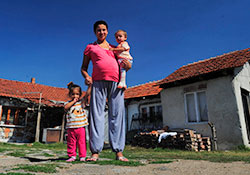Child marriage – a threat to health

UNFPA/Gorgi Licovski
Data from 2000–2009 suggest that 19% of women aged 20–24 years throughout the WHO European Region were in a union or marriage before the age of 18, with the Republic of Moldova, Georgia, Turkey and Tajikistan accounting for the highest rates. Child marriage disproportionately affects girls and has an impact on their mental and physical health for the rest of their lives. Not only are they denied the right to choose their own partner, they are marginalized and subject to various religious, societal, political and cultural practices that fail to honour their basic human rights.
Child marriage, human rights and health
The physical health of the female spouse in a child marriage faces several threats. These young girls are often the victims of domestic violence, and they lack the means to advocate for themselves. Additionally, child brides often live with their husband’s extended family, which may also be a source of violent abuse, in crowded conditions.
Their psychological well-being and empowerment also suffer, as young girls in child marriages are denied an appropriate childhood and adolescence, and are subject to an increased incidence of psychological abuse as well as domestic violence; a curbing of personal liberty; an incomplete education; and a lack of employment and career prospects – all of which contribute to the cyclical nature of poverty, gender inequality and child marriage.
The sexual and reproductive health of the female in a child marriage is likely to be jeopardized, as these young girls are often forced into sexual intercourse with an older male spouse with more sexual experience. The female spouse often lacks the status and the knowledge to negotiate for safe sex and contraceptive practices, increasing the risk of acquiring HIV or other sexually transmitted infections, as well as the probability of pregnancy at an early age. Complications from pregnancy and childbearing are the leading causes of death among girls aged 15–19 years. Often, those in child marriages do not have access to adequate health and contraceptive services, owing to geographic location or the oppressive conditions of their lifestyle.
WHO and the United Nations Population Fund address the effects of child marriage
There is ample opportunity to address the effects of child marriage on adolescent sexual and reproductive health throughout eastern Europe, as anecdotal evidence suggests that child marriage is on the rise in the European Region, with the renewed emphasis on cultural identity. WHO, the United Nations Population Fund and other international development partners are committed to reducing child marriage and its effects.
WHO addressed the issue of child marriage at the Sixty-fifth World Health Assembly in 2012. Thirty countries and seven observers made comments on the paper prepared by the WHO secretariat, which served as a forum for participants:
- to address intervention strategies;
- to describe the current situation of early marriage in their country; and
- to acknowledge that child marriage is a clear violation of human rights and a threat to the safety and health of adolescents.



